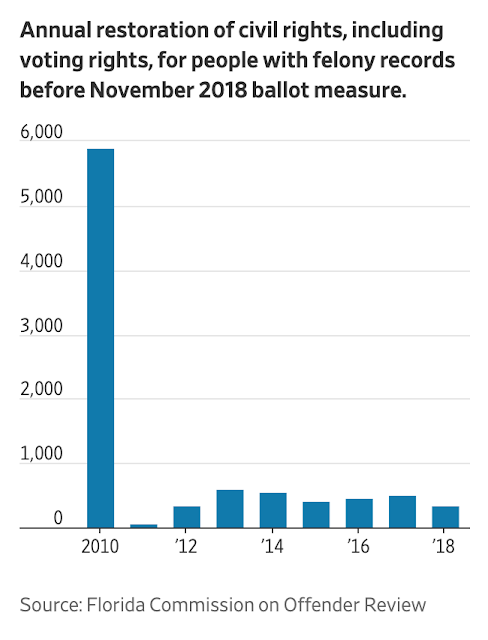PROS AND CONS
This February 18th marks the deadline that will determine if a large number of marginalized voters will have rights in the Florida primaries. These marginalized voters are felony records. The state of Florida has provided little information to election officials on how people with felony records can meet these voting requirements since the law passed last year. Florida is often a swing state when it comes to voting. It contains 29 electoral votes, which can often make it the dealbreaker when it comes to election night. It was reported that in 2012, Obama won Florida by just .9%.
In 2018, the disenfranchisement of Floridians with felony records ended with an amendment vote of 65%. The only felony citizens that were not allowed to vote according to the amendment were those with murder or sexual assault convictions. What was not made clear initially was that felons must pay any dues or fees owed to the state in relation to their charge before voting. Often, these fines can be upwards of thousands of dollars, making this a difficult task to accomplish, especially by the primary voting deadline in February. In addition, there is not a direct resource to consult about dues, fees or fines for felons. They often have to discuss these matters with consult clerks of courts, who can sometimes only have outdated documents to refer to. This process is not made easy by any means and reflects further marginalization of felons.
If you want to read more about felon voting rights, read more on the Prison Fellowship: https://www.prisonfellowship.org/.
Campo-Flores, A., & Kamp, J. (2020, February 8). Florida Voted to Give 1.4 Million Felons the Right to Vote. It Hasn't Gone Smoothly. Retrieved from https://www.wsj.com/articles/florida-voted-to-give-1-4-million-felons-the-right-to-vote-it-hasnt-gone-smoothly-11581174000
Savidge, M. (2016, August 9). Florida: The swingiest swing state. Retrieved from https://www.cnn.com/2016/08/09/politics/election-2016-donald-trump-hillary-clinton-florida/index.html


Comments
Post a Comment
Let your knowledge, ideas, and innovation be heard. Tell us what you think and know about this topic.